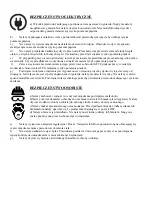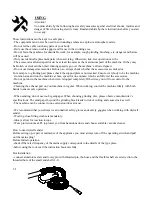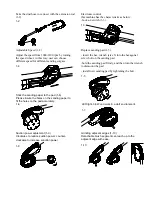
ELECTRIC SAFETY
a)
The power cord plug shall always suit the socket. Never adjust the socket. Do not use
plug hubs. Non-adjusted plugs and appropriate sockets reduce the risk of electric shock injury.
b)
Prevent body contact with conductive surfaces to avoid a risk of electric shock injury.
c)
Do not expose the tool to rain or wet locations. Presence of water in electric tool highly increases the risk
of electric shock injury.
d)
Do not force the cord. Keep the cord away from heat sources, oil, sharp edges or movable parts. Damaged
cord increases a risk of electric shock injury.
e)
When manipulating in exterior areas consider an extension cord intended for outdoor use specifically.
Using an exterior extension cord decreases a risk of electric shock injury.
f)
It is strictly recommended to use a ground fault circuit interrupter (GFCI) when manipulating the tool in a
wet area. Using of GFCI decreases a risk of electric shock injury.
g)
A double insulated tool is equipped with a polarized plug (one prong is wider than the other). If the
connector does not fully suit the socket, turn the plug. Do not change the plug by any means. Double insulation
eliminates the need for grounding of power cord and power supply system.
PERSONAL SAFETY
a)Stay alert and do not use the tool when under influence of alcohol.
b)Use safety glasses and face or dust mask. Wear protective hearing equipment, helmet and
boots.
c)Avoid unintentional starting. Before connecting to power source or battery, make sure the
switch is at OFF position.
d)Dress properly. Do not wear loose clothing or jewelry. They can be caught with moving parts.
e)Remove adjusting keys and wrenches. Tool or adjusting key you leave attached to a turning
part of the tool may cause injury.
f)
Do not overreach. Proper footing and balance at all times allow better control of the tool in unexpected
situations.
g)
Use approved protective equipment only.
ELECTRIC TOOL HANDLING AND MAINTANCE
a)
Do not force the tool.
b)
Do not use if the ON/OFF switch does not work properly.
c)
Disconnect the plug from socket and/or battery from the tool prior any adjustment,
accessory replacement or storage of tool. These preventive safety precautions reduce a risk
of accidental starting of tool.
d)
When not in use, idle tools should be stored in a place out of reach of visitors and children.
e)
Maintain careful manipulation with the tool. Check for deflecting or jamming of turning parts, damaged
parts or other conditions which may influence operating with the tool.
f)
Keep tools sharp and clean for better and safer performance. Properly serviced tools are less likely to
become covered in impurities and are better controlled.
g)
Use equipment recommended by the producer of your model only. Modifications and accessories used at
one tool may be dangerous when used with another model.





































